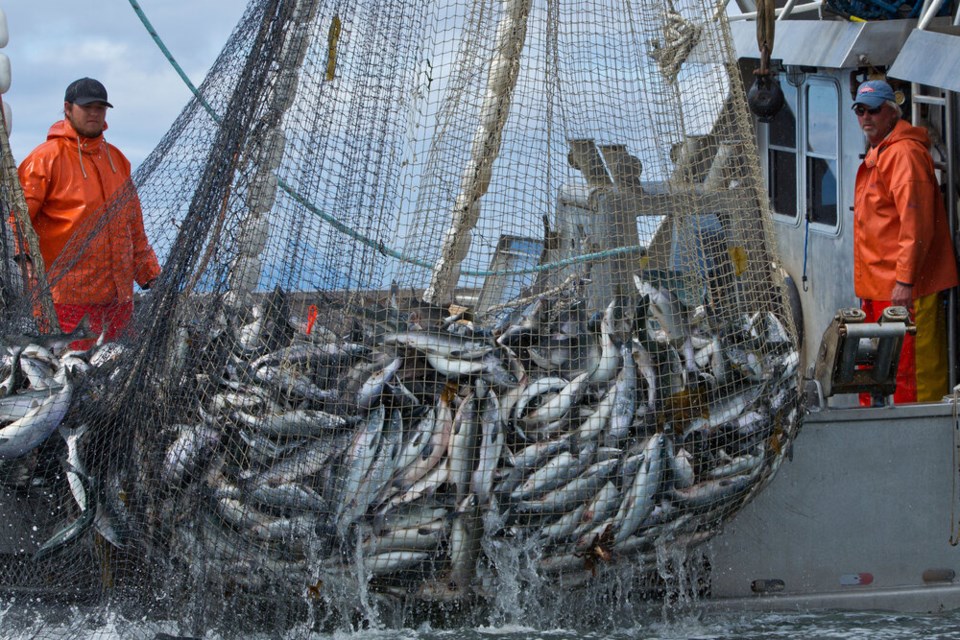The world’s largest seafood sustainability label has dismissed a formal objection from several B.C. conservation groups seeking an end to an Alaskan salmon fishery’s “sustainable” certification.
The complaint, filed with the Marine Stewardship Council (MSC) in April 2024, challenged the targeting of several salmon species in southeast Alaska's District 104.
Raincoast Conservation Foundation, Watershed Watch and Skeena Wild claimed the fishery in that part of Alaska is intercepting millions of salmon before they can reach southern endangered southern resident killer whale populations as well as their home rivers in B.C., Washington and Oregon.
The complaint says the Alaskan fishery has not met past MSC conditions for certification, relies on incomplete data under the Pacific Salmon Treaty, and mischaracterizes certain fish stocks.
One of the central complaints alleges that Alaska mischaracterizes basic facts about how the purse seine fishery off Alaska’s Panhandle operates — namely, that purse seine fishers are dumping non-target species, or bycatch, onto the deck of the boats where the fish inevitably die.
Evidence presented in the complaint to independent adjudicator Melanie Carter was deemed to have a “reasonable prospect of success” and was “neither spurious or vexatious.”
The submissions were also deemed strong enough to prompt the Canadian-based OceanWise body to pull its eco-labels for the southeast Alaska fishery in July 2024. Carter weighed arguments from both sides at a hearing in Seattle on Sept. 17 and 18.
“At the heart of this objection is the core issue that the Alaska Fishery accounts for a very large share of the harvest of Canadian Salmon,” she wrote in a decision dated Oct. 30, 2024.
In dismissing the B.C. groups' complaint, Carter said there was limited data available regarding interceptions of certain stocks in both Canadian and Alaskan fisheries.
She said both Canada and the U.S. are parties to the Pacific Salmon Treaty and so have agreed to adhere to existing management strategies, harvest levels and interception levels to ensure sustainable fisheries.
Doug Vincent-Lang, commissioner for Alaska’s Department of Fish and Game, said in an earlier interview with Glacier Media that any challenges to the sustainability of Alaska’s salmon fishery should be heard through that bilateral treaty.
“We are convinced that our fisheries are sustainably managed,” the commissioner said in April.
Kaitlin Yehle, a fisheries biologist with SkeenaWild, said the adjudicator's decision was disappointing but not surprising. She said the MSC criteria are worded in such a way that it allows for low standards.
Those standards, she said, allow the body to certify a number of fisheries whose sustainability has been called into question. In 2020, an MSC’s move to certify the first Atlantic bluefin tuna fishery led the World Wildlife Fund to denounce the organization it helped established in 1996.
Giuseppe Di Carlo, the group’s director of Mediterranean Marine Initiative, said at the time that the evaluation process was “compromised by failures in impartiality and scientific rigour” and that its outcome would determine “if science has been overruled by profit.” The next month, MSC certified the tuna fishery.
“They make a profit from certification,” said Yehle. “It just really calls into question the credibility of this organization.”
Yehle said she worries the latest MSC decision will end up misleading consumers when they go to the grocery store to buy salmon.
“The salmon will continue to be sold with the MSC blue check mark saying it’s sustainable,” said the biologist. “That’s just really not the case with the southeast Alaskan fishery.”





